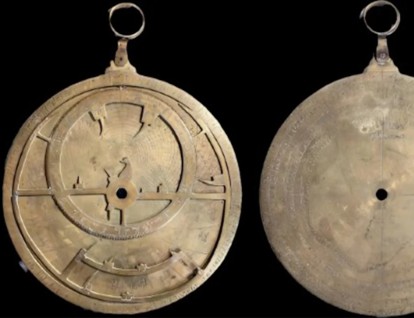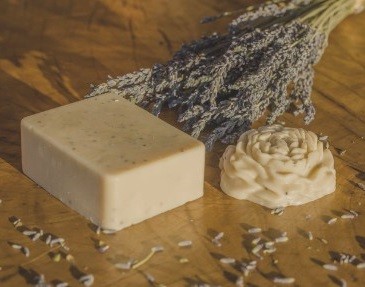Made by Muslims
This section contains external resources to help acknowledge Muslim Heritage Month. It is also an opportunity to discover how Muslim thinking, innovations and discoveries shaped the world.
Astrolabe - The Smartphone of the Middle Ages
The astrolabe were smartphones of the Middle Ages, portable devices for timekeeping, date keeping, and wayfinding. Although likely invented by the Greeks, they entered European science through Muslim astronomers, who greatly refined their uses. One Arabic astronomer wrote in the 10th century astrolabes had more than 1,000 applications.
Source: Astrolabe - The Smartphone of the Middle Ages
Date: 31st May 2024
Making of solid soap bars established in Islamic Golden Age
Although soap predates Islam, the concept of fragranced solid soap bars date back to the 10th century Middle East. The recipes for soap-making were developed by the Muslim alchemist Abu Bakr Muhammad Ibn Zakariya Al Razi. Production became widespread with Syria becoming a main exporter to the rest of the Islamic World, and Europe.
Source: The House of Islam
Date: No Date
Al-Khwarizmi was the Father of Algebra
In 830, Muḥammad ibn Mūsā al-Khwārizmī, published Al-Kitab al-mukhtasar fi hisab al-jabr wa’l-muqabala” (The Compendious Book on Calculation by Completion and Balancing), which is considered the foundational text of modern algebra. Algebra is derived from the word, Al-Jabr.
Source: New Scientist
Date:
Camera obscura invented in the 11th century by Ibn al-Haytham
Modern day photographic cameras were developed from the camera obscura, which was a way of projecting imagery onto a larger space. In the 11th century, Alhazen (or Ibn al-Haytham) invented the camera obscura and the pinhole camera. He experimented on light passing through a small pinhole in a darkened room and showed how the image from one side of a hole could be projected at the screen on the other.
Source: Photography history facts
Date: No Date
The History of the Graduation Gown
When students from the West would graduate from Islamic universities, and other institutions, they would wear the thobe-like graduation gown, to show they had graduated from a Muslim university. This was to mimic what the scholars would wear, that some say symbolized success.
Source: Medium
Date: 14th October 2023
First degree granting university
The world's oldest degree granting university was founded by a Muslim woman, Fatima al-Fihri. In 859, she established the University of al-Qarawiyyin in Fez, in Morocco. It still operates today. Universities as we know them today started to become established in Europe in the following centuries.
Source: Uni Scholars
Date: 13th July 2023
Abbas Ibn Firnas - The first man to fly
Inventor Abbas Ibn Firnas was the first to fly with a heavier-than-air machine, staying in flight and living to tell the tale. he did this more than a thousand years before the Wright brothers, specifically in the year 875. He designed a glider made of wood and silk (decorated with feathers from several different birds), and launched himself from the La Arruzafa hills, near Cordoba.
Source: Aertec
Date: 26th April 2022
Five Muslim scientists who shaped optics
Five Key Muslim scientists who made a historical contribution to the field of optics such as the removal of cataracts and other surgical techniques, anatomical illustration of the eye, how the eye sees, eyes diseases and laying the foundations for optical devices like cameras.
Source: Optometry Today
Date: 15th April 2021
Muslims invented the fountain pen
Despite various European claims, the earliest historical record of a fountain or reservoir pen (i.e. a writing instrument that holds its own ink supply rather than requiring dipping) dates back to the 10th century. In 953, Ma’ād al-Mu’izz, the caliph of Egypt, demanded a pen which would not stain his hands or clothes, and was provided with a pen which held ink in a reservoir and delivered it to the nib, and could be held upside-down without leaking. Such a pen was then made for him.
Source: Pens etc Blog
Date: 21 January 2021
Muslims introduced paper to Europe
Muslims were responsible for the transfer of paper-making from China to Europe by refining and improving techniques and then transforming them into mass production via paper mills in Iraq then spreading to Syria, Palestine, Egypt and Morocco before reaching Spain in the 10th century and then rest of Europe. The first use of paper in England did not come until 1309.
Source: https://www.1001inventions.com/paper/
Date: Jan 2018
History of Coffee
The history of coffee can be traced back to its discovery in Ethiopia to the Arabs roasting and grinding coffee beans and brewing them in hot water as well as trading it and opening up coffee houses. The word coffee has its roots in the Arabic word 'qahwah.'
Source: PBS
Date: 8th April 2013
First psychiatric hospital in the world
Al Razi (one of the greatest Islamic physicians) established the first psychiatric ward in Baghdad, Iraq in 705. This was the first psychiatric hospital in the world. He viewed mental disorders as medical conditions and were treated by using psychotherapy and drug treatments.
Source: NCBI
Date: Jan 2013
Knowledge of the pulmonary circulation
Ibn al-nafis (1213–1288) was an Arab physician who made significant contributions to the early knowledge of the pulmonary circulation. He forms an important link between the early studies of the school of Galen (130–199) in the 2nd century and the European Renaissance scholars. However, little has been written about him in the physiological literature.
Source: NCBI
Date: 9th October 2008
Muslim made carpets led to the emergence of the British carpet industry
Carpets were introduced into British society via trade with the Muslim world and were considered a form of Islamic art. The earliest recorded English contact with the carpet was in the 12th century when it was bought as a gift for a church. Carpets featured in portraits of Royals as they were regarded as a sign of wealth, status and power. The Turkish carpets eventually led to the emergence of the British carpet industry.














